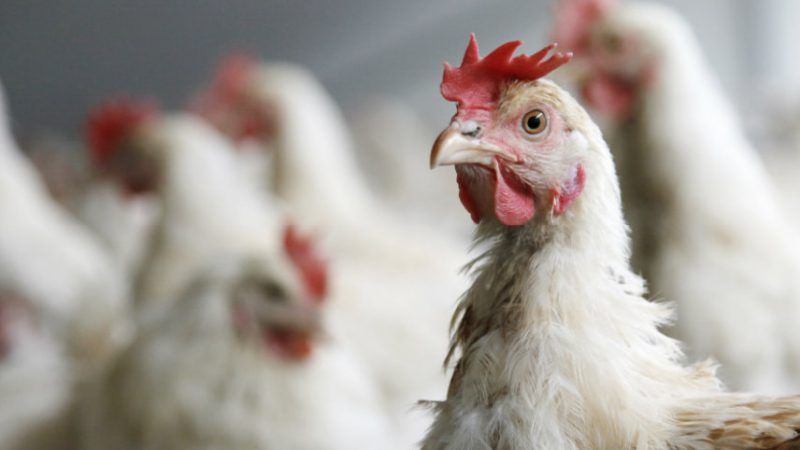California's Animal Rights Initiative Is an Abuse of the Ballot Box
Voters shouldn't be asked to make decisions about how much space a chicken needs in its cage.

Critics of California's voter-initiative process often rail against "ballot-box budgeting," which refers to the way these measures often impose major budget outlays by democratic fiat. Average voters probably can't even name all of their representatives, let alone explain how the state's finances work. Yet they are called upon to make complex fiscal decisions based usually on campaign mailers and ballot titles.
I've got no problem with voters deciding broad, easily understood issues. Should a gas tax increase be repealed? That's the topic of Proposition 6. Had the state attorney general given that one a fair title and summary, it would at least be a simple up-or-down vote on gas taxes. The voting public is perfectly capable of making such decisions—or at least as capable as the not-always-so-brilliant lawmakers who represent them in the Senate and Assembly.
But, increasingly, initiatives involve complex budgeting and regulatory matters that might take hours of analysis to cast an informed vote. They sometimes are placed on the ballot by special interest groups and arguably are money grabs. Others are placed on the ballot by groups with an ideological agenda, but they often are no easier to understand than the bond measures.
A good rule of thumb: If you read the ballot summary, pore over pages of explanation from the admirably fair-minded Legislative Analyst's Office, peruse the official pro and con arguments in the voter booklet and still have no clue what the darn thing would do, then that measure has no business on the ballot. The best thing is to vote "no" on such measures, which are a misuse of the initiative process.
Perhaps the best—but not only—example of this foolishness on the Nov. 6 ballot is Proposition 12, which "establishes new standards for confinement of specified farm animals" and "bans sale of noncomplying products." It sounds simple, in that it proposes minimum space requirements for farmers who raise veal calves, breeding pits and egg-laying hens. But delve into the details, and this one is anything but clear cut.
One finds animal-welfare advocates on both sides of the issue, thus making it nearly impossible to determine whether this potentially costly spate of regulations would even improve the lot of some of the state's farm animals. After spending too much time researching it and still having no idea how to vote, I called my daughter, an agriculture student, and had her explain it to me. Voting really shouldn't be this difficult. (She's a "no.")
For instance, the "yes" argument, signed by the state director for the Humane Society of the United States and two others, argues that the measure "will eliminate inhumane and unsafe products from these abused animals from the California marketplace" and "reduces the risk of people being sickened by food poisoning and factory farm pollution." It argues that it's "wrong to cram a hen tightly in an overcrowded wire cage for her entire life."
There really isn't a spate of food poisoning caused by the state's already highly regulated farms. I'm not immune to concerns about the life of animals, even chickens. In fact, I took a break from writing this column to go into our back pasture and provide some overripe peaches and stale bread to our six hens, and they squawked with joy (hey, it sounded joyful). Nevertheless, wasn't that cage issue resolved a decade ago?
That's when California voters approved Proposition 2, which according to the LAO, "generally prohibits California farmers from housing pregnant pigs, calves raised for veal, and egg-laying hens in cages or crates that do not allow them to turn around freely, lie down, stand up, and fully extend their limbs." My entire family voted "yes" on that, even though we're aware of the downside of imposing costly new regulations on the people who provide our food. We have quite a few farm animals (goats and chickens, mostly) and it seems inhumane to have them spend their short and dreary lives in a pen that doesn't allow them any movement.
Proposition 12 would apparently make these restrictions tougher and eliminate work-arounds from the 2008 proposition. But the "no" argument, penned by other animal activists, argues that the initiative will make things worse for our feathered friends: "Falsely promoted as a 'cage-free' measure, Proposition 12, in fact, explicitly legalizes the continued use of egg-factory cages for years to come." Opponents call it "a reckless exploitation of California's initiative process" that "puts in grave danger a wide array of existing consumer, animal, and environmental protection laws."
There need to be limited regulations that reduce animal cruelty, but which don't impede the ability of farmers to provide affordable and healthy food. Does this new initiative advance that idea? I'm as confused about it as ever, but I am certain that measures such as this should be resolved in the Legislature and not at the ballot box.
This column was first published by the Orange County Register.
Steven Greenhut is Western region director for the R Street Institute. He was a Register editorial writer from 1998-2009. Write to him at sgreenhut@rstreet.org.


Show Comments (43)